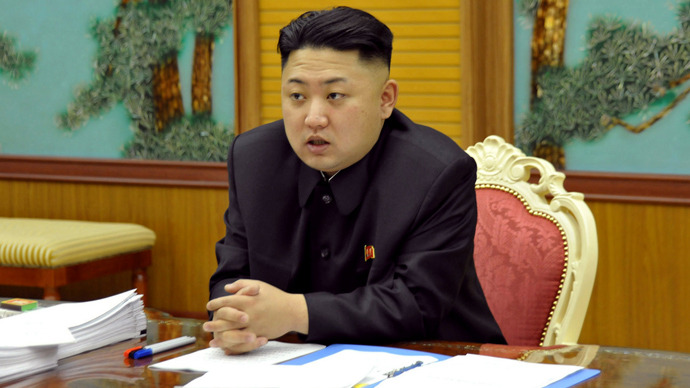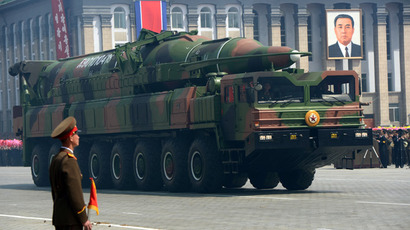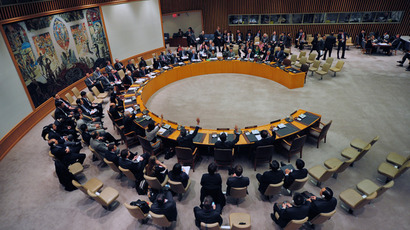N. Korea rejects UN sanctions as war ghosts are conjured

Amid the growing tension in the Korean Peninsula, Pyongyang has formally rejected the new round of UN sanctions aimed at undermining its missile and nuclear programs. The sanctions, while trumpeted as a serious blow to North Korea, may prove futile.
The resolution passed by the UN Security Council on Friday is the fifth of its kind since 2006, when the Democratic People's Republic of Korea (DPRK) conducted its first nuclear test. Adopted in response to the third detonation of a nuclear device by North Korea, it aims to tighten financial restrictions and cargo inspections against Pyongyang.
Responding to the move, the North said in a statement by a Foreign Ministry spokesman: "The DPRK, as it did in the past, vehemently denounces and totally rejects the 'resolution on sanctions' against the DPRK, a product of the US hostile policy toward it."
"The world will clearly see what permanent position the DPRK will reinforce as a nuclear weapons state and satellite launcher as a result of the US attitude of prodding the UNSC into cooking up the 'resolution’," Pyongyang said.
The adoption of the new round of sanctions and particularly enlisting the support of China, North Korea’s sole ally, was hailed as a big step forward by some diplomats. UN Ambassador to the United Nations Susan Rice, who led the drafting of the document and negotiated with Beijing on the matter, said that "these sanctions will bite and bite hard."
The sanctions are not unlike those imposed by the US and its allies against Iran in early 2012, which some Western officials say were successful. They crippled Tehran’s oil exports and hurt its economy, which suffered from rampaging inflation. But there is some doubt that the restrictions would be effective with North Korea, which has a much more closed economy stemming from its state ideology of self-reliance.
In addition, China’s support of the sanctions on the top level may become mitigated on the level of implementation. For example, while the resolution makes inspections of cargo going to North Korea mandatory, it is up to the inspecting country to judge whether it is related to missile or nuclear development and is subject for detention.
“Really, the sanctions themselves aren’t going to make a huge difference in this conflict, and I think going along with it, whoever knows what gets decided and traded off at the back door of politics,” told RT Eric Sirotkin, co-founder of the National Campaign to End the Korean War.
A day after the UNSC resolution was adopted Beijing indicated that sanctions are not the key to easing the tension in the Korean Peninsula.
"We always believe that sanctions are not the end of Security Council actions, nor are sanctions the fundamental way to resolve the relevant issues," China's Foreign Minister Yang Jiechi said Saturday at a media conference.
He added, "The only right way to resolve the issue is to take a holistic approach and resolve the concerns of all parties involved in a comprehensive and balanced manner through dialogue and consultations."
China is far from welcoming a nuclear North Korea at its borders, but it has limited leverage on Pyongyang and cannot make it disarm through diplomatic means. However, cutting trade links and aid may result in the collapse of the regime, which would prove greater problems for China.
Those may range from thousands of economic refugees rushing into China and stockpiles of arms looted from the North’s military depots spreading across the region all the way up to a new war. Many experts say such considerations will make Beijing reluctant in mounting pressure on its troublemaker neighbor.
The sanctions come amid heightened tension between North Korea and its opponents. The US and South Korea are conducting massive annual military games not far from North’s border, much to Pyongyang’s annoyance. The DPRK’s military command said it suspects the drills to be a cover for preparation of a real attack and threatened to response in full force, warning that North Korea will not share the fate of Balkans, Iraq or Libya.
North Korea also announced Friday that it is withdrawing from the armistice agreement which ended the war in 1953. It is the sixth time since 1994 that Pyongyang has done so, each of the episodes linked to some violent conflict or escalation of tensions between the two Koreas. Seoul never signed the document.
Friday’ pull-out from the non-aggression pact is accompanied with the severing of a hotline between Pyongyang and Seoul. This may have dangerous and absolutely unintended ramifications.
“Even though none of the countries, none of the parties want a full-scale war, any small incident in the Korean Peninsula could lead to both sides stepping on the escalation ladder. That’s how wars start, even when there’s no intention for war,” anti-war activist Brian Becker told RT.
“The need now is to reduce tensions, and the onus for that is not on North Korea, which is not threatening the US. It’s the US that should stop carrying out war games simulating the invasion and bombing of North Korea and lift sanctions,” he said.














